Data science encompasses various roles, each with unique skills and knowledge. But because of their significant overlap, each role's nuances can be challenging to grasp. One distinction that may be initially confusing is that of data scientist vs data engineer.
If you’re interested in becoming a data scientist or data engineer, choosing the right career path involves understanding each role's required skills and the nature of data professionals' daily work.
Data scientists and data engineers are among the most sought-after professions in the data field. The U.S. Bureau of Labor Statistics forecasts a 35% increase in data science and an 8% increase in data engineering between 2022 and 2032—making both roles among the fastest-growing jobs.
This article explores the crucial differences between data engineers and data scientists, their job descriptions, and the education and skills necessary to excel in them.
Key Insights
- Significant growth projected for both: 35% for data scientists, 8% for data engineers, between 2022 and 2032.
- Data scientists analyze data and create predictive models, while data engineers build and maintain data storage infrastructure.
- Common programming languages: SQL and Python for data engineers; Python and R for data scientists.
- Data visualization is key in both roles, with Tableau and Power BI being popular tools.
- The field demands diverse skills, with engineering skills increasingly required for data scientist roles.
- Both roles require proficiency in cloud skills due to the shift of data operations to the cloud.
- Data engineers typically hold a bachelor's degree in computer science or engineering, while data scientists often have advanced degrees in statistics or computer science.
- Certifications in specific programming languages, databases, or big data tools are beneficial.
- Average salaries for both roles according to Glassdoor: data scientists on average earn \$154,755 per year, while data engineers earn an average of \$152,982 per year.
Table of Contents
- Data Engineer vs Data Scientist: Roles and Responsibilities
- Data Engineer vs Data Scientist: Skills
- Data Engineer vs Data Scientist: Education
- Data Engineer vs Data Scientist: Salary
- Data Engineer vs Data Scientist: Career Path
- Data Engineer vs Data Scientist: Key Differences
- How to Become a Data Engineer
- How to Become a Data Scientist
- FAQs
Data Engineer vs Data Scientist: Roles and Responsibilities
If you're considering a career in data science, it's crucial to understand the nuances of each role. Here, we’ll explore the differences and similarities between various positions from an employer's perspective.
What Is a Data Engineer?
Data engineers build and maintain complex systems for data collection, storage, and delivery within a business. They design data pipelines crucial for the seamless flow of data across an organization—consistently optimizing data collection, transportation, and availability for analysis.
The data engineering career involves meticulously cleaning and standardizing data to ensure its accuracy and reliability. These big data engineers manage vast databases and automate repetitive data-related tasks, saving valuable time and resources. Their main objective is to provide clean, consistent data to analysts and scientists, facilitating data-driven business decisions.
Data engineers also have a significant role in data management, implementing strategies for efficient data storage, organization, and retrieval across the organization's systems and platforms.
While their primary focus is on the underlying infrastructure, data engineers' duties can overlap with data scientists' work—especially in large organizations where handling big data from various sources demands specialized engineering skills.
What Is a Data Scientist?
If that’s the role of a data engineer, then what exactly does a data scientist do?
Data scientists are proficient in various techniques to guide strategic business decisions. By applying statistics, computer science principles, and machine learning algorithms, they can extract the necessary insights from data to steer decision-making.
Unlike data engineers, data scientists transform complex business issues into solvable data queries. They meticulously analyze data to reveal trends and build models predicting future outcomes.
Data scientists excel at communicating complex findings clearly and persuasively. They often employ data visualization and storytelling techniques to help stakeholders understand and act upon insights.
Their main objective is to guide decision-making. Depending on the complexity of the challenge, data scientists employ a spectrum of techniques—from traditional statistical analysis to cutting-edge artificial intelligence models.
Data Engineer vs Data Scientist: Skills
While there is some overlap between the skills and knowledge base of data science vs data engineering, the roles are distinct. Data scientists primarily focus on analyzing data and developing predictive models. In contrast, data engineers are tasked with building and maintaining robust data storage infrastructures, resulting in distinct skills needed for each role.
Programming Skills
Both data engineers and data scientists require a strong foundation in programming. But the specific languages and technologies employers desire vary, reflecting the unique requirements of each specialization.
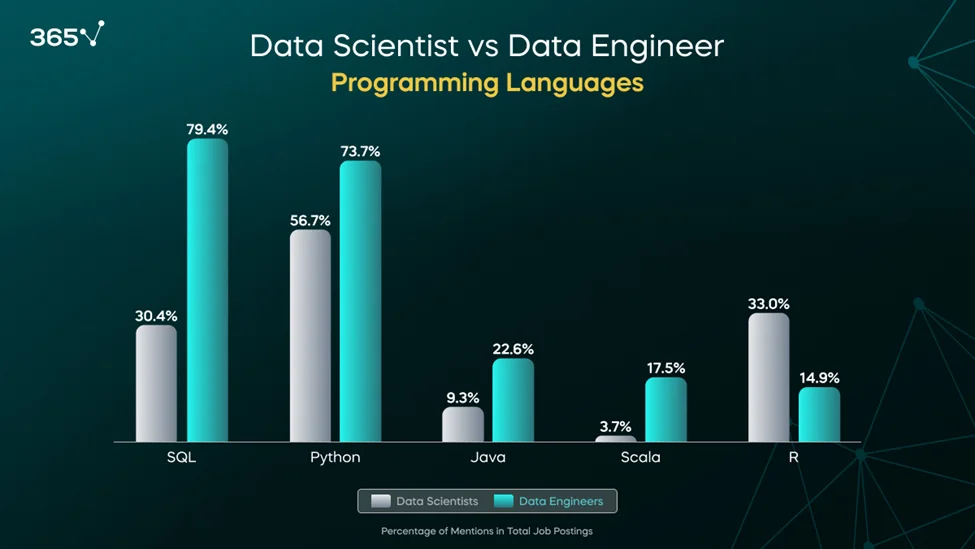
|
Rank |
Programming Languages for Data Engineers |
Percentage (Data Engineers) |
Programming Languages for Data Scientists |
Percentage (Data Scientists) |
|
1 |
SQL |
79.4% |
Python |
56.7% |
|
2 |
Python |
73.7% |
R |
33% |
|
3 |
Java |
22.6% |
SQL |
30.4% |
|
4 |
Scala |
17.5% |
Java |
9.3% |
Data Engineers
Programming languages are essential for data engineers, enabling them to construct, manage, and enhance data systems and pipelines. Our 2024 data engineer job market research highlights several crucial programming languages.
- SQL: Found in 79.4% of job postings, SQL is essential for interacting with relational databases, querying data, and managing data stored in structured formats. It’s, therefore, the most valued programming language for data engineers.
- Python: Appearing in 73.7% of listings, Python is widely used due to its readability, extensive libraries, and flexibility in data manipulation, processing, and machine learning. This ensures its place as a requirement in both data science and engineering.
Lastly, Java and Scala are mentioned in 22.6% and 17.5% of listings, respectively. Thanks to their application in big data environments, they continue to be essential—particularly with technologies like Apache Hadoop and Apache Spark.
Data Scientists
Programming languages are equally fundamental tools for data scientists. They facilitate the analysis and modeling of complex datasets. Our research on the 2024 data science job market highlights the following key languages.
- Python: Paramount in 56.7% of job postings, Python is favored for its powerful libraries and ease, excelling in statistical analysis, machine learning, and data manipulation.
- R: Present in 33% of listings, R is a core language renowned for statistical computing and a rich package set for data analysis, marking a critical distinction between data science vs data engineering.
- SQL: Essential in 30.4% of postings, SQL highlights its importance in data querying and manipulation within relational database management systems.
Job-Specific Skills
The major difference between data science and data engineering lies in the distinct skills and technologies specific to each field despite their overlaps.
Data Engineers
- Database Management: Proficiency in SQL and NoSQL databases
- Big Data Tools: Experience with Spark, Hadoop, and Hive
- Data Warehousing: Understanding of platforms like Amazon Redshift, Google BigQuery, or Snowflake
- ETL Development: Skills in crafting ETL processes for data transformation
- Data Pipeline Tools: Familiarity with Apache Kafka and Apache Airflow for data management
- Data Governance: Ensuring data's availability, usability, integrity, and security
- Containerization: Knowledge of Docker for modern, cloud-native development and microservices
Data Scientists
- Machine Learning Frameworks: Proficiency with TensorFlow or scikit-learn is essential for developing predictive models and conducting advanced analyses.
- Statistical Techniques and Mathematics: Familiarity with advanced statistical techniques and mathematics is crucial for performing A/B testing, time series analysis, and hypothesis testing.
- Sentiment Analysis and NLP: Sentiment analysis and natural language processing skills are essential for text data projects.
- Mathematical Computing Libraries: Proficiency in using libraries like NumPy or Pandas in Python is necessary for handling large datasets efficiently.
- Interactive Coding Environments: Familiarity with Jupyter Notebooks or similar environments is beneficial for prototyping and sharing data analyses.
- Data Integration: Combining data from different sources and software to ensure a seamless data environment is key for comprehensive data analysis.
- Distributed Computing Frameworks: Knowledge of frameworks like Apache Flink or Apache Storm is vital for processing data in real time across computer clusters.
Overlapping Skills
Here, we identify the critical skills where data science and data engineering roles converge.
Data Visualization
Data visualization is a common requirement in job postings for data engineers and data scientists. Expertise in data visualization tools enables the clear communication of insights from data.
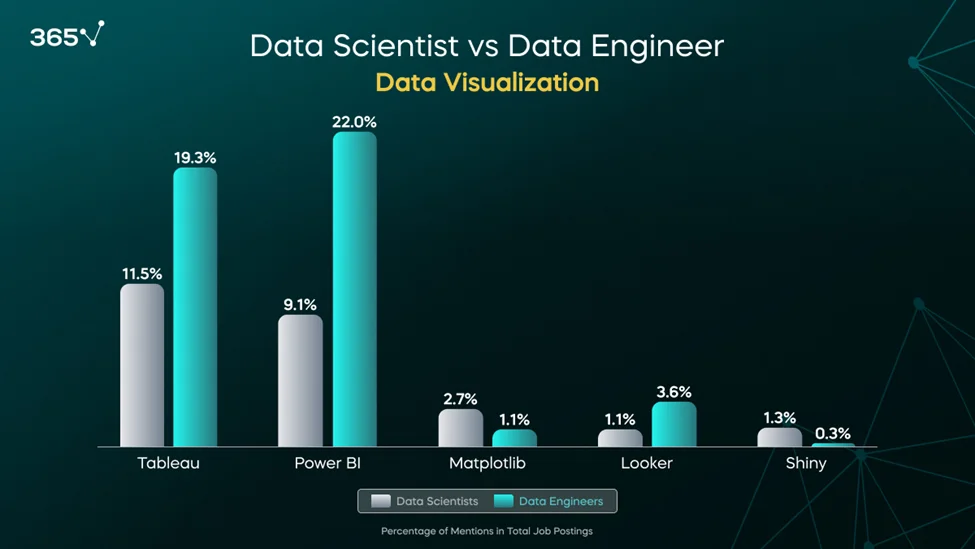
|
Rank |
Data Visualization Software for Data Scientists |
Percentage (Data Scientists) |
Data Visualization Tools for Data Engineers |
Percentage (Data Engineers) |
|
1 |
Tableau |
11.5% |
Power BI |
22.0% |
|
2 |
Power BI |
9.1% |
Tableau |
19.3% |
|
3 |
Matplotlib |
2.7% |
Looker |
3.6% |
|
4 |
Shiny |
1.3% |
Matplotlib |
1.1% |
Our research on job postings revealed that tools like Tableau and Power BI are leading in both fields. Surprisingly, data visualization is mentioned more frequently in data engineer postings than in data scientist postings.
Microsoft Office Tools
Employers greatly appreciate proficiency in Microsoft Office tools. Such a skillset empowers data scientists and data engineers to articulate their work and discoveries efficiently in a business environment.
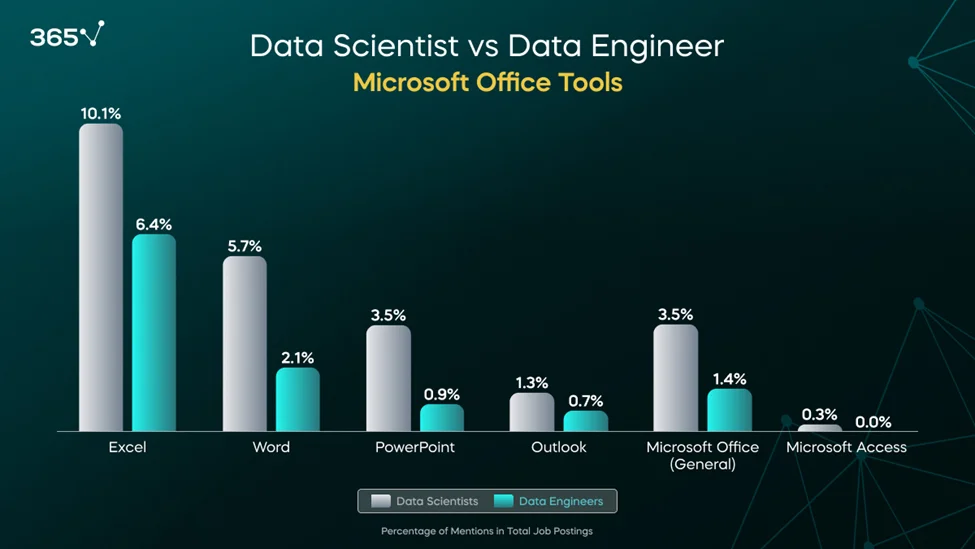
|
Microsoft Office Skill |
Percentage (Data Scientists) |
Percentage (Data Engineers) |
|
Excel |
10.1% |
6.4% |
|
Word |
5.7% |
2.1% |
|
PowerPoint |
3.5% |
0.9% |
|
Outlook |
1.3% |
0.7% |
|
Microsoft Office (General) |
3.5% |
1.4% |
|
Microsoft Access |
0.3% |
- |
Excel is a sought-after skill for both roles, but the data shows that Microsoft Office skills are particularly valued for data scientists over data engineers.
Data scientists frequently need to present their findings and insights in a format that stakeholders can easily understand, using tools like Excel for analysis and PowerPoint for presentations.
AI in Data Engineering vs Data Science
In recent years, AI has significantly impacted all tech sector areas, including data. Our research indicates that while AI hasn't reduced the job market for these roles, it has become an increasingly essential part of their requirements and activities.
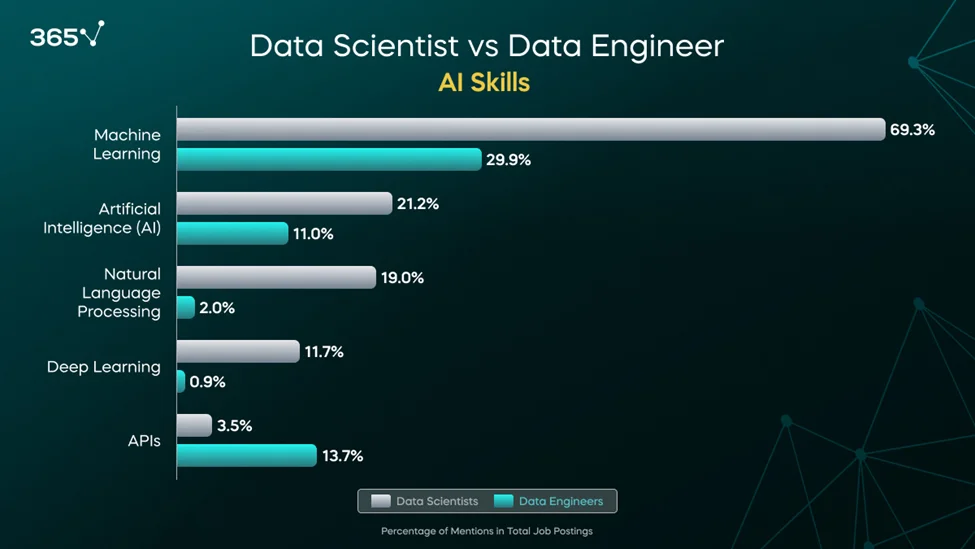
|
Rank |
AI Skills in Data Science Postings |
Percentage (Data Scientists) |
AI Skills in Data Engineering Postings |
Percentage (Data Engineers) |
|
1 |
Machine learning |
69.3% |
Machine learning |
29.9% |
|
2 |
AI |
21.2% |
APIs |
13.7% |
|
3 |
Natural Language Processing |
19% |
Artificial Intelligence (AI) |
11.0% |
|
4 |
Deep learning |
11.7% |
Natural Language Processing |
2.0% |
|
5 |
APIs |
3.5% |
Deep learning |
0.9% |
Our research data suggests that, so far, the AI revolution has more profoundly affected data science than data engineering.
Machine Learning (ML)—the highest-ranked AI skill—appears in almost 70% of data science job listings, compared to just 30% for data engineering roles.
Data science dominates nearly all AI skills. But interestingly, APIs play a crucial role in data engineering by linking diverse data systems and services, enabling seamless data exchange essential for constructing robust data pipelines.
Because ML is the most frequently mentioned AI skill in both fields, here we will explore its specific applications in data engineering vs data science.
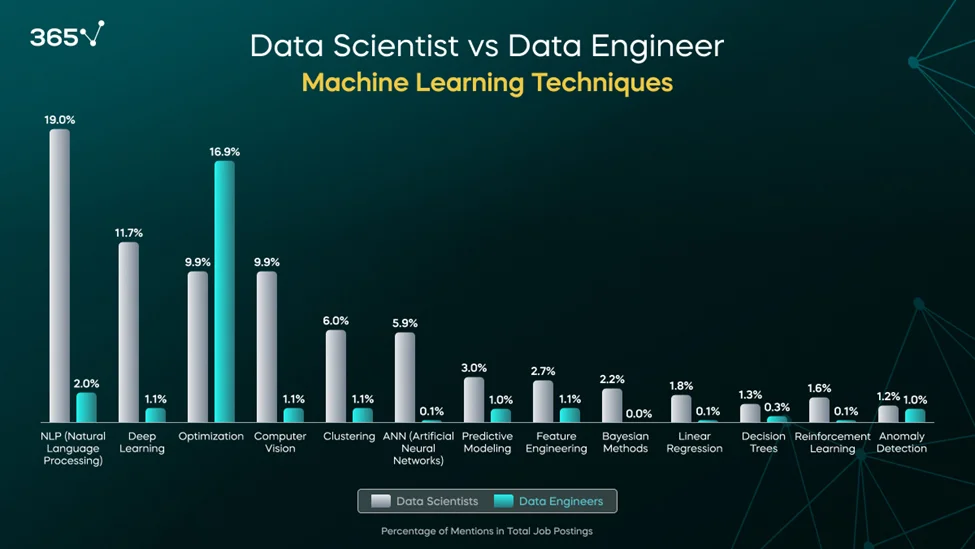
|
Rank |
ML Techniques in Data Science Postings |
Percentage (Data Scientists) |
ML Techniques in Data Engineering Postings |
Percentage (Data Engineers) |
|
1 |
Natural Language Processing (NLP) |
19.0% |
Optimization |
16.9% |
|
2 |
Deep learning |
11.7% |
Natural Language Processing (NLP) |
2.0% |
|
3 |
Optimization |
9.9% |
Computer vision |
1.1% |
|
4 |
Computer vision |
9.9% |
Deep learning |
1.1% |
|
5 |
Clustering |
6.0% |
Clustering |
1.1% |
|
6 |
Artificial Neural Networks (ANN) |
5.9% |
Feature engineering |
1.1% |
|
7 |
Predictive modeling |
3.0% |
Predictive modeling |
1.0% |
|
8 |
Feature engineering |
2.7% |
Anomaly detection |
1.0% |
|
9 |
Bayesian methods |
2.2% |
Decision trees |
0.3% |
|
10 |
Linear regression |
1.8% |
Reinforcement learning |
0.1% |
The table shows that while the skills mentioned for data scientists and data engineers overlap, the emphasis on each skill differs between the roles.
For example, NLP and deep learning are highly valued in data science roles—reflecting the importance of processing and learning from textual data and complex pattern recognition.
On the other hand, optimization—the most mentioned technique for data engineers—indicates their need to enhance the performance and efficiency of data systems.
Unanticipated Skills in Data Science vs Data Engineering
One noticeable trend in our job market research in 2024 is an intensified demand for diverse talent in data roles, with employers increasingly valuing advanced, cross-disciplinary skills.
Data Engineering Skills in Data Science
Our job market research this year found that engineering skills are increasingly showing up in data scientist job postings.
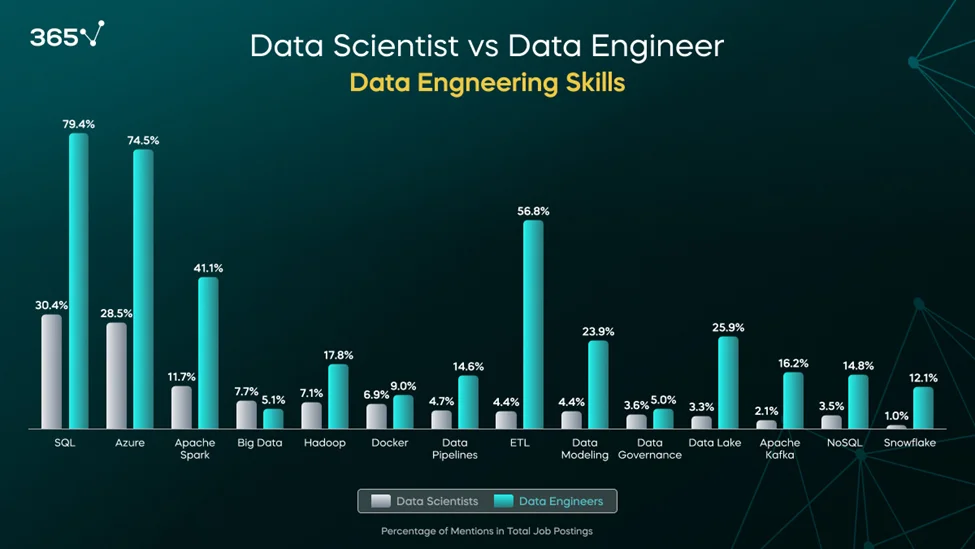
|
Rank |
Data Engineering Skills (From Data Science Postings) |
Percentage (Data Science Postings) |
Data Engineering Skills (From Data Engineering Postings) |
Percentage (Data Engineering Postings) |
|
1 |
SQL |
30.4% |
SQL |
79.4% |
|
2 |
Azure |
28.5% |
Azure |
74.5% |
|
3 |
Apache Spark |
11.2% |
ETL |
56.8% |
|
4 |
Big Data |
7.7% |
Apache Spark |
41.1% |
|
5 |
Hadoop |
7.1% |
Data Lake |
25.9% |
|
6 |
Docker |
6.9% |
Data modeling |
23.9% |
|
7 |
Data pipelines |
4.7% |
Hadoop |
17.8% |
|
8 |
ETL |
4.4% |
Apache Kafka |
16.2% |
|
9 |
Data modeling |
4.4% |
NoSQL |
14.8% |
|
10 |
Data governance |
3.6% |
Snowflake |
12.1% |
This table highlights the most in-demand data engineering skills, as mentioned in job listings for data science and data engineering roles—though the skills are from the perspective of data engineering requirements.
Specializations in cloud data engineering or big data engineering are sought after as companies grapple with ever-larger, increasingly decoupled datasets. This decoupling refers to the trend where data is spread across various sources and systems, requiring robust engineering practices to ensure its seamless flow and accessibility for analysis.
SQL and Azure rank highly in both. Big Data, on the other hand, appears in 7.7% of data science posting, suggesting that engineering techniques are utilized in data science to handle the significant datasets standard in both fields.
Cloud Skills
As more companies move data operations to cloud platforms, there's a growing need for data engineers to have cloud skills. These skills are vital for building and managing data infrastructures that can adapt and efficiently process varying amounts of data.
Although often categorized under data engineering skills, cloud skills empower data scientists with scalable computing power and advanced tools. These resources are crucial for efficiently processing vast datasets and deploying intricate models.
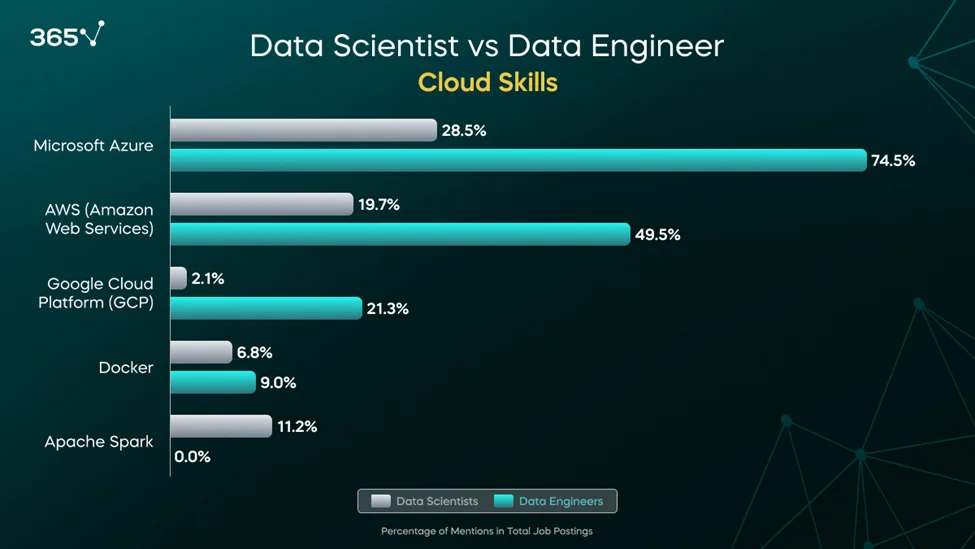
|
Rank |
Cloud Skills in Data Science Postings |
Percentage (Data Scientists) |
Cloud Skills in Data Engineering Postings |
Percentage (Data Engineers) |
|
1 |
Microsoft Azure |
28.5% |
Microsoft Azure |
74.5% |
|
2 |
Amazon Web Services (AWS) |
19.7% |
Amazon Web Services (AWS) |
49.5% |
|
3 |
Apache Spark |
11.2% |
Google Cloud Platform (GCP) |
21.3% |
|
4 |
Data management |
7.4% |
Docker |
9.0% |
Our research shows that data scientists and data engineers highly value Microsoft Azure and AWS—though the emphasis is significantly greater for data engineers.
Apache Spark is more prominent among data scientists, reflecting its analytical capabilities. In contrast, for data engineers, Google Cloud Platform and Docker are vital skills—underscoring the importance of cloud services and containerization in their roles.
Data Analysis Skills in Data Engineering
Data analysis skills are closely associated with data science because data scientists primarily interpret complex data, extract insights, and make predictions using statistical models and machine learning.
On the other hand, concentrate on constructing and maintaining the infrastructure necessary for data collection and analysis.
Nevertheless, data analysis is valuable for a data engineer because it enhances the engineer's ability to understand the context and impact of the data infrastructure on the insights derived from it.
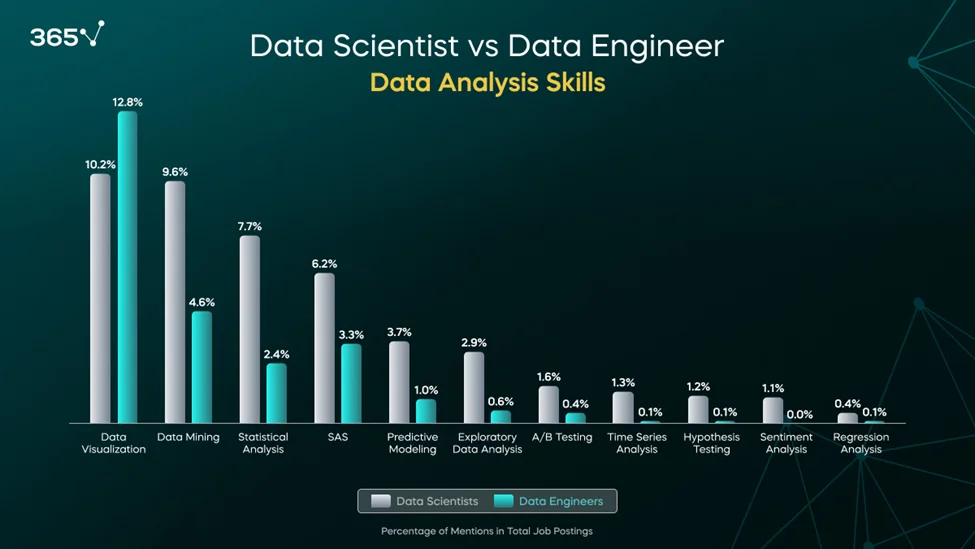
|
Rank |
Data Analysis Skills (Data Science Postings) |
Percentage (Data Science) |
Data Analysis Skills (Data Engineering Postings) |
Percentage (Data Engineering) |
|
1 |
Data visualization |
10.2% |
Data visualization |
12.8% |
|
2 |
Data mining |
9.6% |
Data mining |
4.6% |
|
3 |
Statistical analysis |
7.7% |
SAS |
3.3% |
|
4 |
SAS |
6.2% |
Statistical analysis |
2.4% |
|
5 |
Predictive modeling |
3.7% |
Predictive modeling |
1.0% |
|
6 |
Exploratory data analysis |
2.9% |
Exploratory data analysis |
0.6% |
|
7 |
A/B Testing |
1.6% |
A/B Testing |
0.4% |
|
8 |
Time series analysis |
1.3% |
Regression analysis |
0.1% |
|
9 |
Hypothesis testing |
1.2% |
Time series analysis |
0.1% |
|
10 |
Sentiment analysis |
1.1% |
Hypothesis testing |
0.1% |
As we discussed, data visualization is a crucial skill for data science and data engineering, as it helps communicate findings.
Data mining involves extracting patterns and knowledge from extensive datasets. To facilitate this process, data engineers are responsible for creating and optimizing the required data storage and retrieval systems—likely giving it a higher frequency in data engineering job postings.
In the following eight skills, however, it’s clear that job postings place more importance on advanced statistical analysis techniques for data science than data engineering.
Data Architecture Skills
One unanticipated group of advanced skills that appeared in job listings for both roles is data architecture.
Data architects design and create blueprints for data management systems. These systems integrate, centralize, protect, and maintain organizations’ data sources for analysis and decision-making.
Data architecture skills overlap with data engineering as both roles require a deep understanding of efficiently structuring, storing, and retrieving data—ensuring its quality and accessibility for analysis and processing.
Data architecture and data science converge in the requirement for structured data environments—facilitating advanced analytics and model building.
The following is a closer look at how data architecture skills have become valued in data scientist vs data engineer job postings.
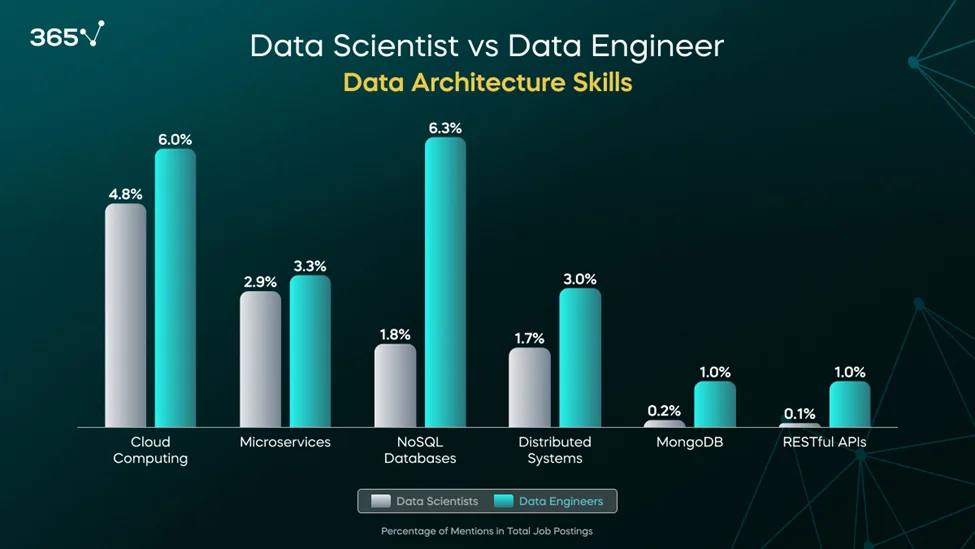
|
Rank |
Data Architecture Skills (Data Science Postings) |
Percentage (Data Science) |
Data Architecture Skills (Data Engineering Postings) |
Percentage (Data Engineering) |
|
1 |
Cloud computing |
4.8% |
NoSQL databases |
6.3% |
|
2 |
Microservices |
2.9% |
Cloud computing |
6.0% |
|
3 |
NoSQL databases |
1.8% |
Microservices |
3.3% |
|
4 |
Distributed dystems |
1.7% |
Distributed systems |
3.0% |
|
5 |
MongoDB |
0.2% |
RESTful API |
1.0% |
|
6 |
RESTful APIs |
0.1% |
MongoDB |
1.0% |
The data indicates a more profound overlap between data architecture and data engineering than with data science.
NoSQL databases are the most mentioned in data engineering postings, highlighting the role's emphasis on non-relational data structures.
On the other hand, cloud computing is most prevalent in data science postings—mirroring the growing reliance on cloud services in data analytics workflows.
Data Engineer vs Data Scientist: Education
In 2024, the academic criteria for data specialists are expanding, blending traditional degrees with unconventional skillsets.
Degree Requirements
Becoming a data engineer or data scientist typically begins with a bachelor's degree in a relevant field.
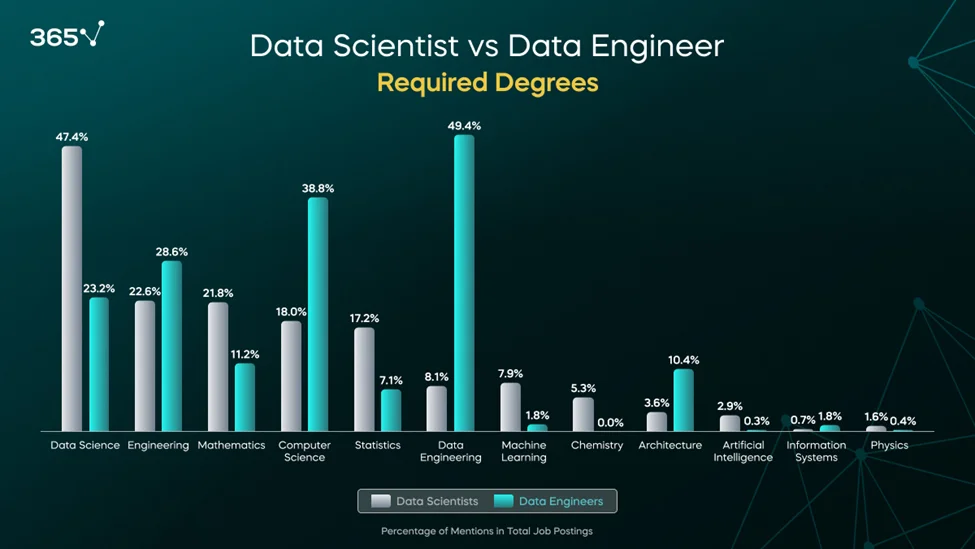
|
Rank |
Degrees (Data Science Postings) |
Percentage (Data Science) |
Degrees (Data Engineering Postings) |
Percentage (Data Engineering) |
|
1 |
Data Science |
47.4% |
Data Engineering |
49.4% |
|
2 |
Engineering |
22.6% |
Computer Science |
38.8% |
|
3 |
Mathematics |
21.8% |
Engineering |
28.6% |
|
4 |
Computer Science |
18.0% |
Data Science |
23.2% |
|
5 |
Statistics |
17.2% |
Mathematics |
11.2% |
|
6 |
Data Engineering |
8.1% |
Architecture |
10.4% |
|
7 |
Machine Learning |
7.9% |
Statistics |
7.1% |
|
8 |
Chemistry |
5.3% |
Machine Learning |
1.8% |
|
9 |
Architecture |
3.6% |
Information Systems |
1.8% |
|
10 |
Artificial Intelligence |
2.9% |
Physics |
0.4% |
Our job market research shows that role-specific degrees like data science and data engineering are highly sought after in their respective fields, indicating a demand for specialized knowledge.
Despite this, these degrees only account for about 50% of the qualifications mentioned in related job listings.
Mathematics, computer science, and general engineering degrees are also frequently required. Mathematics and statistics align with data science, while computer science and engineering correlate with data engineering.
Interestingly, over a third of the job listings for each role require a degree in fields less traditionally associated with the position. How does this affect degree requirements for data engineering vs data science?
Employers often seek individuals with degrees in AI-related fields—such as machine learning and general AI—for data science roles. This aligns with the previously discussed need for AI skills.
In data engineering, over 10% of job postings require a degree in architecture. Such skills are beneficial in this field, enabling the design of scalable, secure data systems.
Other sought-after fields include information systems, chemistry, and physics, indicating that you don’t necessarily need a specific degree to enter the fields of data science or data engineering.
But what about the general requirement for a degree? How many years of education are typically required for most data scientist and data engineer jobs?
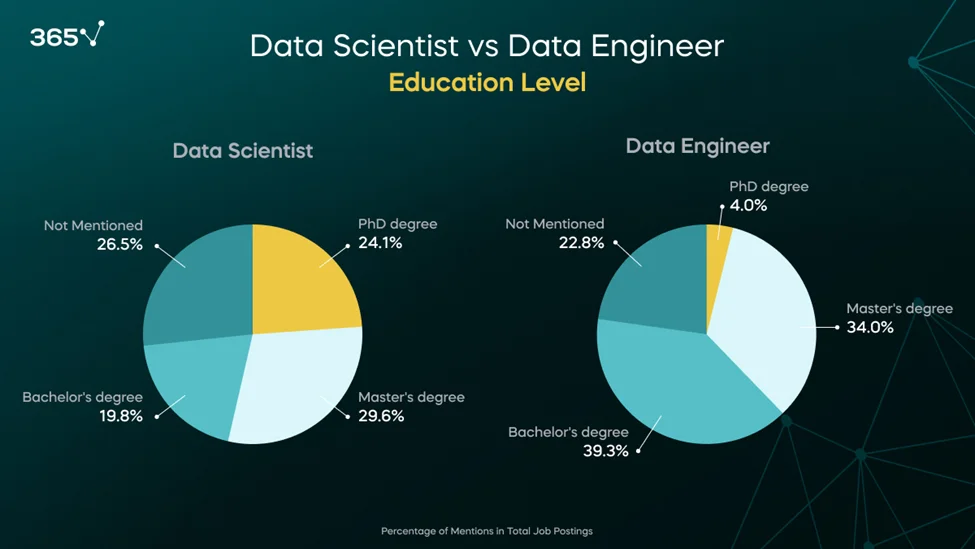
|
Education Level |
Data Science Postings |
Data Engineering Postings |
|
PhD |
24.1% |
4.0% |
|
Master's |
29.6% |
34.0% |
|
Bachelor's |
19.8% |
39.3% |
|
Not Mentioned |
26.5% |
22.8% |
Job market research indicates that higher levels of formal education, like a PhD, are more commonly required in data science job postings than data engineering.
Meanwhile, data engineering job postings show a higher percentage of bachelor's degrees, suggesting a greater diversity of entry points into the field.
A stand-out result in both fields, however, is that about a quarter of the job postings did not mention any specific level of education. This doesn't necessarily imply that those employers are not seeking candidates with degrees. But individuals lacking a conventional education could still be competitive applicants for data scientist and data engineer positions.
Self-directed studies, bootcamps, and online courses—like our Data Scientist Career Track—offer flexible and comprehensive approaches to developing the essential skills for these positions. This approach is more adaptable than a traditional college degree and still offers practical data manipulation or engineering training that these positions demand.
Data Engineer vs Data Scientist: Salary
When it comes to compensation, both fields offer highly competitive salaries.
The salaries of data scientists and data engineers are initially comparable. Still, the difference between data science and data engineering becomes more pronounced with seniority, often benefiting data scientists in advanced roles.
According to Glassdoor, the median annual salary for a data scientist in the US is around \$154,755, with average wages progressing as follows:
- Lead Data Scientist: \$215,863/yr
- Principal Data Scientist: \$277,931/yr
Data engineers, on the other hand, are looking at a lower, but still substantial, salary—paying an average of \$152,982/yr and increasing in more senior roles:
- Lead Data Engineer: \$183,963/yr
- Principal Data Engineer: \$236,455/yr
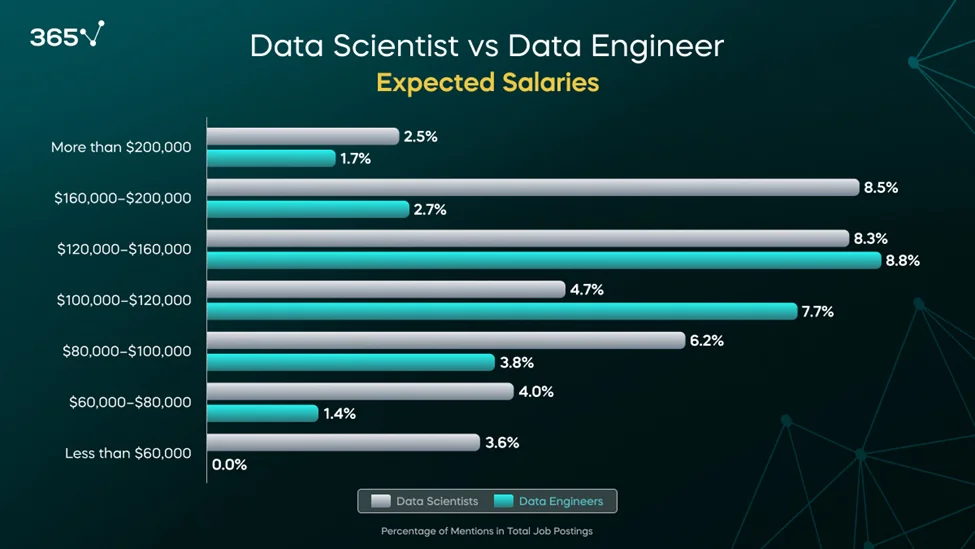
|
Salary Range |
Data Science Postings |
Data Engineering Postings |
|
More than \$200,000 |
2.5% |
1.7% |
|
\$160,000–\$200,000 |
8.5% |
2.7% |
|
\$120,000–\$160,000 |
8.3% |
8.8% |
|
\$100,000–\$120,000 |
4.7% |
7.7% |
|
\$80,000–\$100,000 |
6.2% |
3.8% |
|
\$60,000–\$80,000 |
4.0% |
1.4% |
|
Less than \$60,000 |
3.6% |
- |
Our research—seen in the table above—aligns with the Glassdoor data, indicating that both roles typically offer salaries in the \$120,000–\$160,000 range.
Beyond this, the second most frequently mentioned salary range for data science roles is \$160,000–\$200,000. On the other hand, more entry-level data engineering jobs commonly offer salaries between \$100,000 and \$120,000.
This reinforces the perspective that data science roles typically command slightly higher salaries than data engineering roles. But it's worth noting that only 37.8% of data science and 26.17% of data engineering job postings disclosed the salary.
Data Engineer vs Data Scientist: Career Path
What are the different career paths for data science vs data engineering? Embarking on a career in either field is an ongoing learning and evolution journey.
The following is a comparative glimpse into the typical career paths for these pivotal roles in the tech industry—highlighting the steps and milestones you may expect from a foundational bachelor's degree to advanced professional development.
|
Data Scientist Career Path |
Data Engineer Career Path |
|
Bachelor's Degree (fields like Data Science, Statistics, Mathematics, or a related field) |
Bachelor's Degree (in Data Engineering, Computer Science, Engineering, or related field) |
|
Gain proficiency in programming languages (Python, R) and tools (SQL, Excel). |
Develop strong coding skills—particularly in Java, Scala, or Python, and learn database management. |
|
Acquire knowledge in machine learning, data mining, and statistical analysis. |
Gain experience with big data technologies (Hadoop, Spark) and data pipeline construction. |
|
Complete relevant internships or projects to build a portfolio. |
Work on practical projects or internships to gain hands-on experience with data infrastructure. |
|
Earn a master’s or PhD for advanced positions. |
Pursue certifications or a master’s degree for specialized roles. |
|
Continue learning with online courses and certifications (e.g., 365 Data Science: Data Science Career Track). |
Keep up with latest technologies through continuous learning and certifications (e.g., 365 Data Science courses in SQL, Python, and ML). |
Data scientists and data engineers have complementary skillsets that often overlap—making the transition between roles achievable with targeted learning and experience.
A data scientist aiming to transition into engineering would focus on improving their data warehousing and pipeline development skills. Conversely, a data engineer might look deeper into statistics and machine learning in order to shift to data science.
Both roles thrive on a solid programming base, deep knowledge of data systems, and skills in deriving insights from intricate datasets.
If you want to transition, you don't need to start from scratch. Due to the overlap in skills, you can focus on specific subjects required for each role through numerous online courses and bootcamps.
Suppose you're shifting from data engineer to data scientist. In that case, the following courses on our platform are essential: Machine Learning Process A-Z, The Complete Data Visualization Course with Python, R, Tableau, and Excel, and Statistics.
And if you're moving from data scientist to data engineer, you'll find the following courses on our platform helpful: Advanced SQL for Data Engineering, Data Preprocessing with NumPy, and SQL + Tableau.
Data Engineer vs Data Scientist: Key Differences
After evaluating each role’s specific responsibilities, skills, and requirements, consider the following breakdown of the main differences between data science and data engineering.
|
Aspect |
Data Scientist |
Data Engineer |
|
Fundamental Role |
Analyze data to steer decision-making with statistics and machine learning. |
Build and maintain systems for data collection, storage, and delivery. |
|
Responsibilities |
Extract insights, predict future outcomes, communicate findings. |
Design data pipelines, clean data, manage databases, automate tasks. |
|
Growth Forecast (2022–2032) |
35% increase |
8% increase |
|
Primary Skills |
Statistical analysis, machine learning, predictive modeling |
Database management, ETL processes, data pipeline construction |
|
Programming Languages |
Python, R, SQL |
SQL, Python, Java, Scala |
|
Data Visualization Tools |
Tableau, Power BI, Matplotlib |
Power BI, Tableau, Looker |
|
AI Skills |
Machine Learning, AI, NLP, Deep Learning |
Machine Learning and optimization, APIs, AI |
|
Education |
Data Science, Mathematics, Statistics |
Data Engineering, Computer Science, Engineering |
|
Education Level Required |
Increased prevalence of PhDs |
More bachelor's degree holders |
|
Salary Range |
Typically, \$120,000–\$200,000 |
Typically, \$100,000–\$160,000 |
|
Career Path |
Often begins with a relevant degree, followed by proficiency in programming, machine learning, and internships or projects, with possibly a master's or PhD |
Starts with a relevant degree, strong coding skills, experience with big data technologies, and practical projects or internships, with continuous learning |
The contemporary data landscape is witnessing a trend where the traditional distinctions between data roles—such as data scientists vs data engineers—are becoming increasingly indistinct.
Our findings reveal that skills typically associated with data science are cropping up in data engineering job postings, and similarly, engineering skills are making their way into data science roles.
For instance, 30.4% of data scientist job postings require SQL skills (a staple in data engineering), while data engineering roles now call for machine learning expertise, found in 29.9% of listings.
Moreover, expertise in data architecture is also sought within these postings—suggesting a growing demand for multifaceted professionals capable of spanning multiple disciplines.
Smaller companies may place more emphasis on versatile data specialists because they need employees who can wear multiple hats. Larger organizations have the luxury of seeking out highly specialized individuals focused on narrow, in-depth roles.
Considering this, if you’re interested in entering the field, the difference between data scientists and data engineers might not be as clear-cut as you think.
How to Become a Data Engineer
If you're aiming for a career as a data engineer, you'll usually start with a bachelor's degree in data engineering, computer science, or a similar field. This will provide foundational skills in programming, databases, and system architecture.
Proficiency in Python, Java, Scala, and SQL is essential, as is an understanding of big data engineering technologies like Apache Hadoop and Apache Spark.
Familiarize yourself with ETL processes and data warehousing solutions like Amazon Redshift, Google BigQuery, or Snowflake. Cloud computing skills are also increasingly critical—particularly with AWS, Azure, and Google Cloud.
As with most roles, hands-on experience is invaluable. Build your own data pipelines, contribute to open-source data projects, or explore freelance opportunities to apply your knowledge. This practical experience you might gain through internships or projects is critical for applying theoretical knowledge to real-world scenarios.
Remember that continuous learning is a crucial aspect of a career in data engineering. Stay updated with the latest technologies and methodologies by taking online courses, earning certifications, or attending conferences.
Pursuing industry-recognized certifications in big data technologies or cloud platforms can further validate your expertise and demonstrate your commitment to potential employers.
How to Become a Data Scientist
If you aspire to be a data scientist, start with a bachelor's degree in data science, mathematics, statistics, or a related field.
You’ll need to learn programming languages like Python and R, which are pivotal for this role due to their extensive data analysis and machine-learning libraries.
As a data scientist, you'll use statistics to analyze data and generate insights, so a strong background in statistics and mathematics is also vital.
Proficiency in machine learning, the ability to build predictive models, and skills in data visualization tools like Tableau or Power BI are critical for a career in data science.
SQL knowledge for database management is also beneficial, as is familiarity with big data technologies like Spark or Hadoop.
Remember to gain practical experience through internships or projects and continuously update your skills with online courses and certifications. This will help you apply theoretical knowledge to real-world data problems.
Lastly, create a portfolio showcasing your data science projects and skills. This could include projects from your coursework, personal initiatives, or contributions to open-source projects. It's an effective way to demonstrate your proficiency in data analysis, model building, and data visualization to potential employers. If you’re having trouble coming up with ideas for your own projects, our platform offers prepared projects for you to start.
Need more information on the ins and outs of a data science career? Refer to our Data Science Career Guide for the insights and strategies to land your dream role.
We hope this article has helped you understand the key differences and overlaps between the data scientist vs data engineer roles.
This article was created with the assistance of Platform.sh.
FAQs


![The Data Engineer Job Market in 2024 [Research on 1,000 Job Postings]](https://365datascience.com/resources/blog/thumb@360_dchpoi3t20s-thumb01.webp)
![Data Engineer Job Outlook 2025 [Research on 1,000 Job Postings]](https://365datascience.com/resources/blog/thumb@360_1elm1imlf3e-the-data-engineer-job-market-in-2025-thumb.webp)
![The Most In-Demand Machine Learning Engineer Skills in 2024 [Research on 1,000 Job Postings]](https://365datascience.com/resources/blog/thumb@360_rtwxu4h3tr-1000-ml-engineer-job-postings-analysis-from-indeed-usa-thumb.webp)